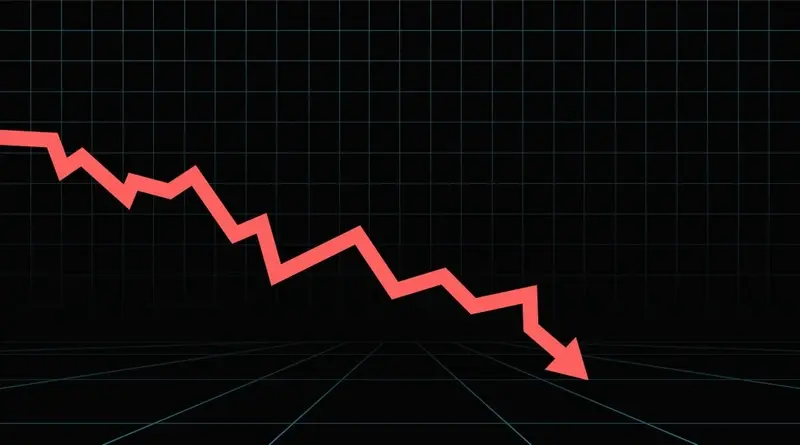
Stocks in London endured another day of losses on Thursday, extending Wednesday's slump, as investors flee out of equities on the prospect of slowing economic growth and runaway inflation.
This was hammered home by US Federal Reserve Governor Christopher Waller, who warned he plans to support an even bigger interest rate increase than last month's three-quarter point hike to fight sky-high inflation.
A full point increase in the benchmark lending rate would be the biggest since the early 1980s.
The FTSE 100 index closed down 102.80 points, or 1.4%, at 7,053.57. The FTSE 250 ended down 230.70 points, or 1.2%, at 18,480.66, and the AIM All-Share closed down 8.23 points, or 0.9%, at 870.94.
The Cboe UK 100 ended down 1.6% at 703.18, the Cboe UK 250 closed down 1.7% at 16,058.91, and the Cboe Small Companies ended down 1.6% at 12,479.16.
In European equities on Thursday, the CAC 40 in Paris ended down 1.4%, while the DAX 40 in Frankfurt ended 1.9% lower.
The European Commission on Thursday slashed growth forecasts for the eurozone, saying the consequences from the war in Ukraine were continuing to destabilise the economy because of record high inflation.
The EU executive, which tracks the economy for the 27 countries in the EU, said GDP growth in the eurozone would reach 2.6% in 2022 and a sharply lowered 1.4% in 2023.
Inflation would end the year at 7.6%, much higher than previously forecast, and 4.0% in 2023. This is still well above the EU's target level of 2.0% and up from a previous prediction of 2.7%.
‘The evolution of the war and the reliability of gas supplies are unknown, so this forecast is subject to a high degree of uncertainty and downside risks,’ EU Economy Commissioner Paolo Gentiloni told a press conference.
The euro stood at $1.0010 at the European equities close Thursday, down against $1.0089 at the same time on Wednesday.
The pound was quoted at $1.1803 at the London equities close Thursday, down compared to $1.1929 at the close on Wednesday.
Against the yen, the dollar was trading at JP¥139.09, up from JP¥137.35 late Wednesday.
On the FTSE 100, Experian topped the index, closing 3.5% higher despite the Dublin-based credit checking company's total revenue growth slowing in its first quarter, as business in all regions except in the Americas shrank.
Total revenue for the quarter that ended June 30 is set to have grown 7%, slowing from 31% a year ago. Revenue for UK & Ireland fell by 6%, compared to growth of 35% a year ago. Europe, Middle East, Africa & Asia Pacific revenue decreased by 8%, swinging from growth of 78% a year ago.
In contrast, Latin America revenue grew by 30%, slowing only slightly from growth of 33% a year before, while North America grew 8%, slowing more substantially from growth of 26% a year ago.
Nonetheless, Chief Executive Brian Cassin said the firm's full-year expectations remain unchanged, anticipating organic revenue growth between 7% to 9%.
At the other end of the bluechip index sat insurer Admiral, the worst performer, down 18% in a negative read-across after smaller rival Sabre Insurance issued a profit warning.
Sabre fell 40% after posting that its interim pretax profit slumped 81% to £4.3 million from £22.2 million a year ago. While gross written premiums increased 17% to £91.8 million from £78.2 million, the combined operating ratio rose to 99% from 74%. Any combined ratio below 100% indicates underwriting profit, so the lower the better, and a 99% ratio is on the verge of loss-making.
Claims inflation has continued to increase through the first half, now standing at around 12%, said Sabre. ‘The increase in claims inflation applies across all of the key drivers of claims cost, including parts, labour, credit hire, paint, car values and availability, and provision of care,’ the firm said.
Peer Direct Line also closed 12% lower.
In the FTSE 250, Playtech closed the day as the index's worst performer. The gambling software developer finished down 18% after Hong Kong-based finance company TTB Partners said it did not intend to make a takeover offer for the firm.
TTB Partners first expressed interest in making an all-cash offer for Playtech back in February, after Playtech shareholders voted down a £2.1 billion offer from Australia's Aristocrat Leisure.
The decision came as a result of challenging underlying market conditions, TTB Partners explained.
On AIM, Kibo Energy closed 21% higher after the firm extended its waste-to-energy power purchase agreement to 20 years from 10 years.
The agreement outlines the construction, commissioning and operation of a 2.7 megawatt plastic-to-syngas power plant to generate baseload electricity for an industrial business park developer in Gauteng province, South Africa. It was first announced in February.
The extension is expected to increase projected earnings before interest, tax, depreciation and amortisation from the project to R 953 million - around £46.9 million - from R 388 million.
Elsewhere in London, miner were hit hard by declines across the commodities markets. Anglo American closed down 5.1%, Glencore down 4.1%, Fresnillo down 5.9% and Rio Tinto 4.7% lower.
Brent oil was quoted at $96.82 a barrel at the London equities close Thursday, down sharply from $100.80 late Wednesday.
Stocks in New York were lower at the London equities close, with the Dow Jones down 1.9%, the S&P 500 index down 1.8%, and the Nasdaq Composite down 1.6%.
JPMorgan Chase kicked off US banking earnings season on Thursday with a drop in profit and a warning over the outlook for the global economy.
In the second quarter of 2022, the New York-headquartered bank reported net revenue of $30.72 billion, up 0.8% from $30.48 billion year-on-year as net interest income jumped 19% to $15.2 billion, boosted by higher interest rates.
New York-based investment bank Morgan Stanley also posted a fall in second-quarter earnings.
Net revenue for the second quarter of 2022 fell to $13.13 billion from $14.76 billion a year before, which reflected a ‘challenging’ market environment.
US factory prices unexpectedly accelerated in June, figures on Thursday showed, just 24 hours after a consensus-busting consumer price inflation figure.
The producer price index soared 11.3% on an annual basis in June, the largest increase since a record 11.6% jump earlier this year, in March. This was faster than the 10.9% growth clocked in May and defied expectations of a slowdown to 10.7%.
Month-on-month growth of 1.1% also marked an uptick from May's rise of 0.9% and beat expectations of 0.8% growth.
The data came a day after US consumer price inflation accelerated to a consensus-busting 40-year high of 9.1% in June, driven by record high gasoline prices.
The beat will put further pressure on the US Federal Reserve to raise interest rates quickly to get a grip on rampant inflation.
In the international economics calendar on Friday, there's Chinese GDP, retail sales and industrial output overnight. The EU reports foreign trade data at 1000 BST before the US shares retail sales data and industrial production in the afternoon.
In the local corporate calendar, there's first quarter results from luxury fashion house Burberry and third quarter results from asset manager Premier Miton.
Copyright 2022 Alliance News Limited. All Rights Reserved.




